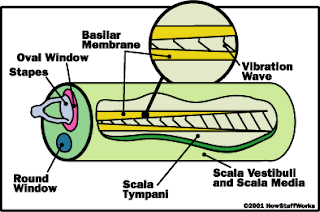The Ear
(is divided into three sections:)
Outer
Middle
Inner
Outer
- Has 2 portions.
- First is Pinna , the skin covered flabby cartilage that is visible.
- Pinna Function : Protect Eardrum , Collect Soundwave through ear canal.
- Second is Auditory Ear Canal(meatus) .
- Function : secrete wax , passage for soundwave.
- Modified sweat glands.
Middle
- Ear Drums
- Also known as (tympanic Membrane)
- Situated between ear canal and middle ear
- Tensor tympani muscles > they pull the eardrums inwards > (rigid , sensitive).
- Tensor tympani muscles partners with stapedius muscle protects human from loud and high pitch noise.
- They also explains why we can hear ourselves when we talk in a crowded area.
- 3 Ossicles ( Tiny bones ) Bones
- Malleus - Hammer
- Incus - Anvil
- Staples - Stir up

The surface area of eardrums is 55 sq millimeters, compared to staple's faceplate (2 sq millimeters )
When a vibrating force acts on eardrums. The eardrums pressure transfered to staple becomes relatively high as nearly as 22X it's previous pressure.
- Inner Ear
- Consists of ( cochlea , semi-circular canals X3 , vestibule (labyrinth)

Cochlea
- Function : Physical vibration > Electrical Signal
- cochlea shape is like a snail's shell. ( For the above illustration, imagine it as a horizontal plane)
- Cochlea has basilar membranes ( 20,000-30,000) reed-like fibres.
- Basilar Membrane are like resonating Tuning Forks
- As a vibration is being transmitted into the cochlea... it produce a ripple effect like a pond inside the cochlea.
- Because of various frequency a sound may produce. As long as it travels further deeper into the cochlea, it will meet a specific frequency that causes an escalation of amplitude , releasing energy in form of electric. ( Resonance )
- Definition of Resonance : vibration of large amplitude produced by a relatively small vibration near the same frequency of vibration as the natural frequency of the resonating system
Cochlea and Basilar Membrane helps us Distinguish Different Frequencies or Tones.


No comments:
Post a Comment